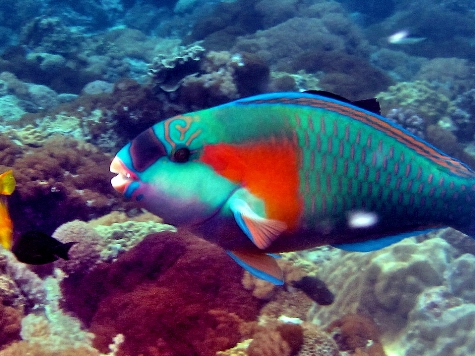Climate change is not to blame for the disappearance of the Caribbean coral reef, an environmental group has admitted. The International Union for the Conservation of Nature (IUCN) has issued a report saying that the blame instead lies in the overfishing of parrotfish and sea urchin, who are the main grazers of the area.
Germany’s Frankfurter Allgemeine Zeitung quotes a statement from the organisation (translated by NoTricksZone), which says:
“Climate change has long been thought to be the main culprit in coral degradation. While it does pose a serious threat by making oceans more acidic and causing coral bleaching, the report shows that the loss of parrotfish and sea urchin – the area’s two main grazers – has, in fact, been the key driver of coral decline in the region. An unidentified disease led to a mass mortality of the sea urchin in 1983 and extreme fishing throughout the 20th century has brought the parrotfish population to the brink of extinction in some regions. The loss of these species breaks the delicate balance of coral ecosystems and allows algae, on which they feed, to smother the reefs. […]
“Even if we could somehow make climate change disappear tomorrow, these reefs would continue their decline,’ says Jeremy Jackson, lead author of the report and IUCN’s senior advisor on coral reefs.”
In a video posted online, the report’s lead author Jeremy Jackson even admits that climate change has not been as bad as expected.
At 3.48 he states:
“There’s nothing in my report, except the realization that climate change hadn’t been as severe as we feared so far, that’s new. The fact and the thing about climate change is that it is an excuse for doing nothing. You know if it’s all those goddamn gringos in the north that made things bad, then I don’t have to do my job.”
Environmental website Watts Up With That says that parrotfish are essential to the very existence of the coral reef. They graze on algae that tries to take over the reef, thus allowing the polyps to get sunlight, and they help create the bed on which the reef sits by grinding up choral and excreting it as sand.
Given IUCN’s new admission, Watts Up With That concludes by saying:
“…although we have no hope of changing atmospheric CO2, we can indeed do something about overfishing of parrotfish, and about coastal pollution. Fix those, and we’ll fix the reefs, and they will abide.”

COMMENTS
Please let us know if you're having issues with commenting.